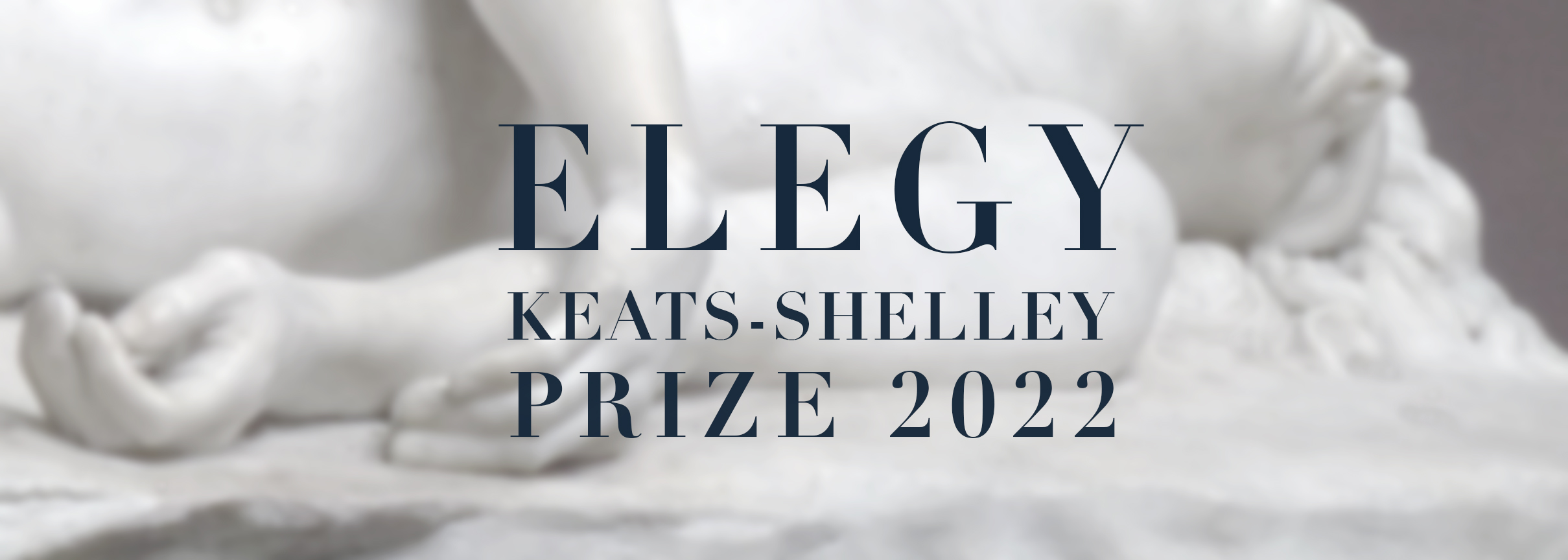Fiona Sampson announces the winners of 2022’s Keats-Shelley and Young Romantics Prizes. Read the winning poems and essays by scrolling down to Shortlist.
Keats-Shelley Prize 2022
Inaugurated in 1998 by the Keats-Shelley Memorial Association, The Keats-Shelley Writing Prize encourages poets and essayists of all ages to respond to the work of the Romantics. Prize Judges have included Dame Carol Ann Duffy, Stephen Fry, Liz Lochhead, Professor Richard Holmes, Dame Penelope Lively, Tom Paulin, Claire Tomalin, Jack Mapanje, and Simon Barnes. 2022’s Prize Judge is Fiona Sampson.
Keats-Shelley Prize 2022
Prize Winners
Poetry Prize Winner
Susan Holland, December Moth outside a care home window
Poetry Prize Highly Commended
Ned Balbo, The Wolves of Chernobyl
Carolyn Peck, Lost
Judge's Comments
Winning Poem: Susan Holland, December Moth outside a care-home window
‘This poem is full of linguistic relish and brilliant imagery, with some really exceptional phrase-making including the last line’s ‘glowing impassable threshold.’ Intense, almost forensic observation creates a rich study of will and intention.’
Runner up: Carolyn Peck, Lost
‘A smartly subtle confessional poem, touching on loss, identity and even perhaps abuse – and done with deft economy.’
Runner up: Ned Balbo, The Wolves of Chernobyl
‘This poem ranges with ambition over a well-imagined landscape and touches on contemporary war as well as ecological destruction.’
Fiona Sampson
Essay Prize Winner
Zoran Varga, Afterlives: Shelley’s transformative rhetoric in Queen Mab note 17
Essay Prize Highly Commended
Elena Bonacini, Keats’s self-transformation as a “Physician to All Men”
Kaushik Tekur Venkata, Gone With the (West) Wind: Shelley, Apostrophe, and Inept Interpellation
Judge's Comments
Winning Essay: Zoran Varga, ‘Afterlives: Shelley’s transformative rhetoric in Queen Mab note 17’
‘In a field of very strong, scholarly essays, this is the stand-out winner because of its comprehension of the resources of the essay form: the writer has chosen to address the pressing contemporary theme of climate emergency, and unpack the ecological ideas in Shelley’s work.’
Runner up: Elena Bonacini, ‘Of Poets, Dreamers and Doctors
Runner up: Kaushik Tekur Venkata, ‘Gone with the (West) Wind
‘These two very fine essays couldn’t be separated with even the thinnest match-paper. I commend both of them for their highly-articulated, scholarly professionalism, and look forward to their publication.’
Fiona Sampson
Shortlists
Read all the shortlisted Poems and Essays below. The poems were chosen by Professor Deryn Rees-Jones and Will Kemp for the Poetry Prize. Professor Sharon Ruston and Professor Simon Bainbridge selected the essays.
Poets were asked to write on 2022’s Prize theme of ‘ELEGY’. This commemorates two bicentenaries: the death of Percy Bysshe Shelley on 8th June 1822 and the composition of Adonais, Shelley’s elegy for John Keats, a year earlier in 1821.
Essays can be on any aspect of the writing and/or lives of the Romantics and their circles.
Visit our Google Earth Elegy World Map which we will continue to update and expand through the autumn.
Poetry Shortlist
Essay Shortlist
Judges
-
Chair of Judges

Fiona Sampson
Fiona Sampson is a writer and poet. Published in thirty-eight languages, she is a Fellow of the Royal Society of Literature and of the Wordsworth Trust, has published twenty-nine books and has received an MBE for Services to Literature.
She’s served on the Council of the Royal Society of Literature and is Trustee of the Royal Literary Fund; other honours include the Newdigate Prize, Cholmondeley Prize, and various awards from the Arts Councils of England and of Wales, Society of Authors, Poetry Book Society and AHRC, and Book of the Year selections. She recently received the 2019 Naim Frashëri Laureateship, the 2020 European Lyric Atlas Prize, and, for Come Down, Wales Poetry Book of the Year 2021.
Sampson’s studies of writing process include Beyond the Lyric and Lyric Cousins: Poetry and Musical Form. She edited Percy Bysshe Shelley (Faber). A critic, librettist and literary translator, she was editor of Poetry Review 2005-12 and has served internationally on the boards of publishing houses and literary NGOs, and on literary juries.
Sampson’s writing about place including Limestone Country, a Guardian Book of the Year 2017. Her internationally acclaimed In Search of Mary Shelley (2018) was finalist for the Biographers’ Club first biography prize, and Two-Way Mirror: The life of Elizabeth Barrett Browning (2021), a New York Times Editors’ Choice and Washington Post and Prospect Book of the Year 2021, longlisted for the 2022 PEN Jacqueline Bograd Weld Award for Biography.
-
Poetry Judges

Professor Deryn Rees-Jones
Deryn Rees-Jones is Professor of Poetry at the University of Liverpool. She won an Eric Gregory award in 1993 and The Memory Tray (Seren, 1995) was shortlisted for the Forward Prize for Best First Collection. Her other works are Signs Round a Dead Body (Seren, 1998), Quiver (Seren, 2004), and a groundbreaking critical study of twentieth-century women’s poetry, Consorting with Angels (Bloodaxe, 2005), which was published alongside her accompanying anthology Modern Women Poets (Bloodaxe, 2005). Deryn’s selected poems, What It’s Like to Be Alive, was published in 2016 and is a Poetry Book Society Special Commendation.
In 2004 Deryn was named as one of Mslexia’s ‘top ten’ women poets of the decade, as well as being chosen as one of the Poetry Book Society’s Next Generation poets.
Deryn has considerable experience as a poetry judge, including the National Poetry Competition, the T.S. Eliot Prize, the Costa Prize (Poetry) and every two years chairs the judging panel for the English Association’s Michael Murphy Poetry Prize for a best first collection of poetry.
Deryn’s most recent book is Paula Rego: The Art of Story, the first full-length survey of one of the most distinctive and important modern artists. Her most recent books of poems are Erato (Seren 2019) shortlisted for the T S Eliot Prize and Welsh Book of the Year, and Hôtel Amour (Seren 2025). She is the editor of the award-winning Pavilion Poetry series for Liverpool University Press, and a Fellow of the Royal Society of Literature.
-

Will Kemp
Will Kemp is a writer of poems, short stories and novels. He is Assistant Editor at Valley Press and has taught Creative Writing at York University.
He has won the Keats-Shelley Prize, Cinnamon Short Story Competition, Debut Collection Award, Coast to Coast Prize, Cinnamon Pamphlet Competition and Envoi International. He has also been well-placed in many others.
His publications include four collections of poems and short stories, two award-winning pamphlets and 500 pieces in Aesthetica, The Guardian, Iota, Magma, The North, Orbis, Poetry News, Rialto, The Times and others.
His debut short story collection, Surviving Larkin, was published recently by Valley Press. His fourth full poetry collection, In Another Life, will also be published shortly by Valley Press.
He regards a commendation in the Keats-Shelley Prize 2006 as the turning point in his writing career since it spurred him on during a time of self-doubt.
-
Essay Judges

Professor Sharon Ruston
Professor Sharon Ruston is a long-standing judge of essay prizes. She is Chair of Romanticism in the English Literature and Creative Writing department at the University of Lancaster.
Her research specialism concerns the relations between the literature, science and medicine of the Romantic period, 1780-1820. She has published The Science of Life and Death in Frankenstein (2021), Creating Romanticism (2013), Romanticism: An Introduction (2010), and Shelley and Vitality (2005). She co-edited The Collected Letters of Sir Humphry Davy for Oxford University Press (2020) and led the AHRC-funded project to transcribe all of the Davy’s notebooks: wp.lancs.ac.uk/davynotebooks/
Read a Q&A with Sharon and Professor Tim Fulford at the BARS Blog.
Visit Sharon’s profile page at the University of Lancaster here.
-

Professor Simon Bainbridge
Professor Simon Bainbridge is a long-standing judge of the essay prizes. He teaches and writes at the University of Lancaster.
His main research interest is in the relationship between the writing of the Romantic period and its historical context. He is the author of Napoleon and English Romanticism (Cambridge University Press, 1995), British Poetry and the Revolutionary and Napoleonic Wars (Oxford University Press, 2003) and Mountaineering and British Romanticism: The Literary Cultures of Climbing, 1770 – 1836 (Oxford University Press, 2020) and the editor of Romanticism: A Sourcebook. He has published in journals such as Romanticism, Romanticism on the Net and The Byron Journal and has written essays and entries for An Oxford Companion to The Romantic Age: British Culture 1776-1832, Romanticism: An Oxford Guide, The Blackwell Companion to European Romanticism, and The Oxford Handbook of British Romanticism. He is a Trustee of the Wordsworth Trust and the Wordsworth Conference Foundation.
Visit Simon’s profile page at the University of Lancaster here.
